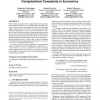Free Online Productivity Tools
i2Speak
i2Symbol
i2OCR
iTex2Img
iWeb2Print
iWeb2Shot
i2Type
iPdf2Split
iPdf2Merge
i2Bopomofo
i2Arabic
i2Style
i2Image
i2PDF
iLatex2Rtf
Sci2ools
131
Voted
SIGECOM
2011
ACM
2011
ACM
A revealed preference approach to computational complexity in economics
Recent results in complexity theory suggest that various economic theories require agents to solve computationally intractable problems. However, such results assume the agents are optimizing explicit utility functions, whereas the economic theories merely assume the agents behave rationally, where rational behavior is defined via some optimization problem. Might making rational choices be easier than solving the corresponding optimization problem? For at least one major economic theory, the theory of the consumer (which simply postulates that consumers are utility maximizing), we find this is indeed the case. In other words, we prove the possibly surprising result that computational constraints have no empirical consequences for consumer choice theory. Our result motivates a general approach for posing questions about the empirical content of computational constraints: the revealed preference approach to computational complexity. This approach complements the conventional worst-cas...
Related Content
| Added | 17 Sep 2011 |
| Updated | 17 Sep 2011 |
| Type | Journal |
| Year | 2011 |
| Where | SIGECOM |
| Authors | Federico Echenique, Daniel Golovin, Adam Wierman |
Comments (0)

